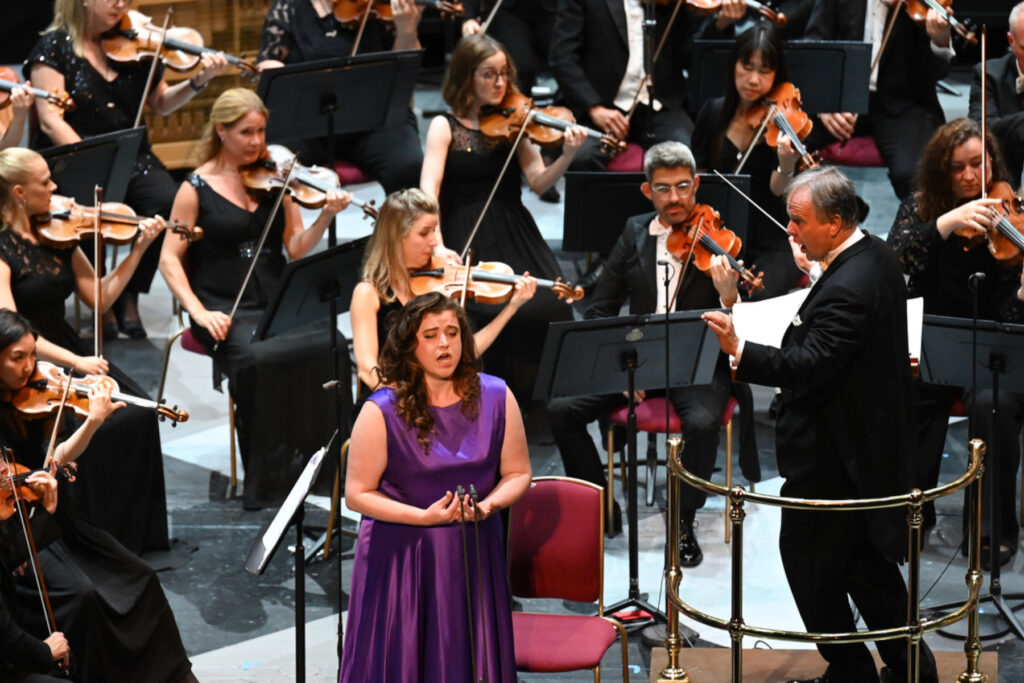With an all-British programme bookended by Eastern influences, variously Buddhist and Sanskrit, this was one of those concerts that looked interesting on paper. The curiosity quota was high, but the reality was slightly less captivating, with admirable, if not remarkable performances that brought only intermittent excitement.
Proceedings began with the Proms premiere of Jonathan Harvey’s Tranquil Abiding (1998); an atmospheric and richly inventive work of some 14 minutes for chamber orchestra and extensive percussion section, framed by quiet string murmurings and culminating in a halo of bamboo clusters. The work takes its name from a Buddhist term describing ‘a state of single-pointed concentration’, its creative impulse generating a repeated falling interval representative of a single slow breathing rhythm. From this raw material, sinuous melodic tendrils emerged allied to a sweeping panorama of timbres, aphoristic woodwind and brass gestures, shimmering strings and otherworldly sounds deployed from tuned gongs, oriental bowls and bells. With so much to draw the ear and eye, the work’s busy parade of shifting sonorities (giving full employment to the percussionist) undercut any sense of Buddhist meditation implied by the work’s title.

There followed a steady-as-she-goes account of Elgar’s Cello Concerto with the Finnish soloist Senja Rummukainen making an assured Proms debut. It was a performance that gave precedence to wistful reverie and ‘autumn bonfires’, with passionate declarations held in check. The work is often regarded as a memorial for a lost generation and has prompted some soloists to perform the concerto as if it were a Requiem. This was the case here, where restraint and somewhat stolid tempi characterised the opening movement. Drama was in short supply and the lilting secondary theme sounded rather too measured. On the plus side, one could hardly fault Rummukainen’s flawless intonation and eloquent phrasing, heard to impressive effect in the poetic half lights of the Adagio, her whispered intimacies occasionally dipping below the radar. If the puckish second movement felt earthbound, the finale eventually took wing, Oramo allowing impish woodwind and snarling brass to emerge from the shadows with ear-catching cameos. Overall, it was a sensitive and shapely interpretation, but with little to quicken the pulse or still one’s breathing.
After the interval, there was much to admire in Holst’s rarely performed The Cloud Messenger receiving its first Proms performance over a century after its disappointing premiere in 1913 at London’s Queen’s Hall. Its neglect has not been helped by a damning assessment from the writer A. E. F. Dickinson who claimed, “There can be no chance of a revival”. But two excellent recordings in recent years (Richard Hickox/ Chandos and Joseph Fort/Delphian) have resuscitated the work’s fortunes. This performance from the BBC Symphony Chorus will have undoubtedly aroused renewed interest.
Holst’s Ode for Chorus and Orchestra, as it is subtitled, is a sumptuous expression of late romanticism and the last of his works occupied by ancient Indian literature and religion which include the Hymns from the Riga Veda and Savitri. The composer’s own translation of words by the fifth century Sanskrit poet Kālidāsa, outlines the tale of an exiled nature spirit who persuades a passing cloud to take a message of love to the Himalayas where a loyal wife awaits his return. Lasting some forty minutes, it’s an ambitious score fusing exotic travelogue and romantic fantasy. If its power hasn’t the imaginative reach of The Hymn of Jesus or fails to hide certain weaknesses (including a longwinded text of indifferent quality), The Cloud Messenger is superbly orchestrated and its stylistic hallmarks, with pre-echoes of The Planets, are readily identifiable. I suspect few would disagree with Vaughan Williams’ opinion of the work when he confided to Holst: “most of it is beautiful and there are only one or two places I don’t care for”.
This account vividly underlined Holst’s gratifying use of the orchestra; a colour chart of sounds showcased by the BBC Symphony Orchestra, with solo and chamber combinations splendidly illuminated. Contralto soloist Jess Dandy delivered an evocative portrait of the lonely wife, tender yet purposeful, her voice especially convincing below the staff. The chorus seemed just a trifle anxious in their contributions, with diction requiring the listener to bury themselves in the programme to follow the words. The performance may not have blazed with conviction, but the work’s remote vistas, yearning sentiment and ecstatic climaxes were all firmly realised. Whatever my reservations, it’s a work that deserves to be heard more often.
David Truslove
Jonathan Harvey – Tranquil Abiding; Edward Elgar – Cello Concerto; Gustav Holst – The Cloud Messenger.
Jess Dandy – contralto; Senja Rummukainen – cello; BBC Symphony Orchestra; BBC Symphony Chorus; Sakari Oramo – conductor
Royal Albert Hall, London, 3 August 2024
All photos by Chris Christodoulou.